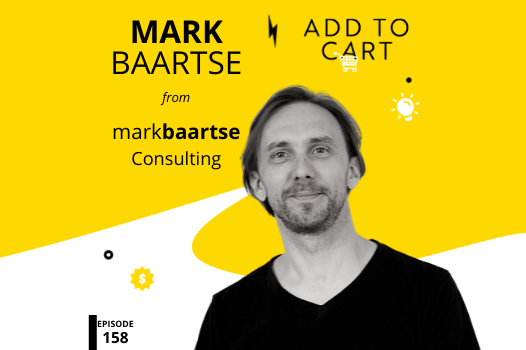In this episode of Add To Cart, we are joined by the James Bond of marketing – Mark Baartse. You call him in when you’ve got a problem to solve and you need the best in the business. Mark is, in his own words, the outsourced Chief Marketing Officer. Before consulting, Mark led the growth for leading fashion brand Showpo and has worked with clients including Catch, Menulog and Officeworks. He has been awarded the Top 50 CMP, Top 50 people in eCommerce and is a regular contributor to publications like Ragtrader and Inside Retail. We wanted to get Mark on Add to Cart, so we could pick his brains on behalf of you – for free. We wanted to focus in on performance marketing because, while it’s not Mark’s only focus, he’s a well rounded CMO and it can be a point of agitation and confusion for many. Hopefully there’s a few nuggets in here which either alleviate your fears or help you make changes. We also touch on customer lifetime value, how to use performance channels for branding and getting yourself into the shoes of the customer.
“It’s gone through companies, this cultural thing, this idea that marketing is a slot machine and you put a dollar in and 30 days later you get $8 out.”
Mark Baartse
Questions answered in this episode include…
- What are the most common problems you solve for eCommerce brands as a fly-in CMO?
- What are the key metrics you are looking at to ensure ROI numbers are accurate?
- Is performance marketing still a viable channel for eCommerce brands?
Don’t be a data-driven moron
“Bullshit, you’re a data driven marketer! You are not a data driven marketer. You’re a moron! Okay?
The number of companies I look at where pretty much the first thing I do is basic data quality checks. And these companies, their data is a disaster and they are making daily marketing decisions on this. I did a project with a company not long ago, several months ago, big company, you would have heard of them. spending half a million a month on Facebook, something like that. So a good size spend, double tracking, half a million, I don’t care who you are, it’s a lot of money, right? They were double tracking the results and they were making daily decisions based on this data that was twice as good as it should have been.
It’s common. That’s the thing. This is not an anomaly. I’d say probably one in three companies I look at have something similar to that. I’m not talking little, this pixel is not quite implemented. I’m talking major, major things. I call anything that’s affecting your data more than 30%, I’m calling major. Probably if we look at that definition, maybe half the companies I look at.
So you’re not data driven if you don’t care about data quality. And almost everyone I’ve talked to doesn’t care about data quality.”
Our problem, not the customer’s
“There’s a process called remote unmoderated user testing, where you actually set a bunch of questions, people record themselves while using your website answering these questions, so you say, “Hey, find a product you’d like, now go add it to your cart and go do this.” And then, you set a bunch of tasks and they do it 10 to 15 minutes usually.
And I got five customers to do this. And I think three of them got to check out. So they both found a product they liked, they added it cart, they got to check out and after checkout, you’re always buying off what’s the shipping price, it said free shipping and three of them said, “Oh wow, free shipping. That’s so good.” But they should know that before they get to cart, that’s obviously going to increase their chances of adding to cart.
And so what happened, I was watching these, I still remember it was a Friday lunchtime. I immediately went and went to that A/B testing tool, within an hour I’d set up an A/B test. They said free shipping on site, it just wasn’t clear enough and people weren’t noticing it. I just went and added this tag that said free shipping, free returns underneath the add to cart button. Ran that as an A/B test, revenue was up 10%. I did a few different copy changes, revenue was up another 10%. So we got an incremental 20% in conversion rate with zero extra media spend based on me spending an hour and a half watching videos of customers.
My favorite saying of all time is don’t make our problem the customer’s problem. It’s not the customer’s problem to solve, it is our problem to solve. And if they they can’t find a button, if they don’t know we’ve got free shipping, that is my problem. It’s not the customer’s problem.”
Regression Modelling
“Basically, what it does is it looks at inputs and outputs. I’m not a statistician, but there’s independent variables and dependent variables. That’s about as deep as my statistical knowledge goes at that point. I’ve got some statisticians I work with on this stuff. And basically they say, okay, this is how much we spend on Google. This is how much we spend on Facebook. And in almost every company, that’s fluctuated for a variety of reasons. And then this is what our revenue is. And it basically says, what is the statistical correlation between your Facebook spend and your Google spend and your revenue? And that will come back with a reasonably accurate number.
Now the downside to regression is it doesn’t look at what we did last week, or it doesn’t look at what this one specific campaign does. So you still do need to use the tools to figure out how to optimize day to day and that’s fine, but for your big picture stuff, how are we assigning budgets? How are we growing the company to 300%? So the stuff I mostly work on, then regression’s a really cool tool.”
Links from the episode:
This episode was brought to you by…





